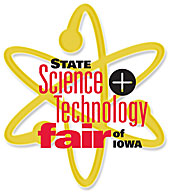AMES, Iowa - De Anna Tibben recently stood before a classroom full of Ames High School students to make sure they were on track for the State Science + Technology Fair of Iowa.
A few of the 37 students taking 25 projects to the fair later this month still needed to rewrite their research abstracts. A few needed to strengthen their bibliographies. And a few needed a second scientist to sign off on their projects.
At the end of their meeting, Tibben, who teaches earth and space science at Ames High, turned to the front of the room and pointed to the big trophy on the lab table.
"Look what we won last year," she said of the fair's top school award.
While the travelling trophy is a point of pride, Tibben's goal for this year's fair isn't to defend the school's title. She wants her students to improve their projects, share their science and make some new friends during the fair on Friday and Saturday, March 30-31, at Iowa State University's Hilton Coliseum and Scheman Building. High school projects will be displayed on the second floor of Scheman; junior high projects will be displayed on the floor and concourse levels of Hilton.
Public hours at the fair are noon to 5 p.m. March 30 in both buildings and from 9:30 a.m. to 3 p.m. March 31 at Hilton. Award ceremonies are also public from 8:30 to 9:30 a.m. and at 5 p.m. March 31 at Hilton.
Andrea Spencer, the director of the state science fair, said organizers expect a record 620 students from around the state this year. Those students will be showing judges, the public and each other 480 projects.
They'll also be competing for about $75,000 in awards, including scholarships and trips to the Intel International Science and Engineering Fair in Pittsburgh in May.
And why the jump from about 550 students?
"We have great teachers," Spencer said. "And we do have some new teachers bringing students to the fair."
Ames High's Tibben started bringing students last year as part of an honors science course. She said the faculty wanted a research project to be a part of the course. Students took their projects to the state science fair and other competitions. And successful competitions led to trips to international science fairs and meetings.
"It has opened up doors for the kids," Tibben said. "That's the neat part of this."
But it takes a lot of work.
Lupe MacIntosh, an Ames High sophomore, is studying the effects of music on the ability to recall information previously learned. It builds on last year's study of the effects of music on the ability to learn new information - a winning project that sent MacIntosh to the annual meeting of the American Association for the Advancement of Science in Vancouver, British Columbia, Canada.
MacIntosh collected data for her latest study by playing different types of music while student volunteers took a multiplication test. Her findings? Students had better recall while taking the test in silence or while listening to hip-hop music.
Rob Bingham, another Ames High sophomore, is studying the relationship between the temperature of egg incubation and the gender of leopard geckos. He has two eggs incubating at different temperatures and is hoping there's a hatch before the state science fair.
He said the project was sparked by his work for the Boy Scout's merit badge in reptiles and amphibians. He's a big fan of leopard geckos and can't learn enough about them.
Tibben said there are a lot of good reasons for science students to do research projects and present them at the state science fair.
They learn responsibility, planning, time management and problem-solving skills, she said.
And, they learn a lot about the scientific process.
"A few of the students think they failed because, 'Oh, it didn't work like I thought it would," Tibben said. "But science never stops. There's never a final answer, just more questions to investigate."
Iowa State is the host of the annual science and technology fair. Major sponsors include the Iowa Biotechnology Association, the Iowa Energy Center, the Iowa Space Grant Consortium and the Monsanto Fund.
